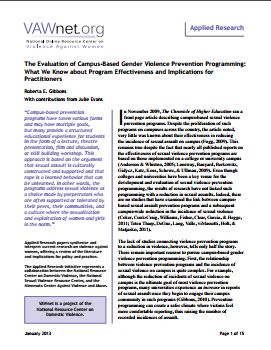Resources Library
Start a Search:
Evaluation of Campus Based Gender Violence Prevention Programming from VAWnet

Colleges and universities have been a key venue for the development and evaluation of sexual violence prevention programming. However, there are no studies demonstrating a link between campus-based sexual assault prevention programs and a subsequent campus-wide reduction in the incidence of sexual violence (Coker, Cook-Craig, Williams, Fisher, Clear, Garcia, & Hegge, 2011; Teten Tharp, DeGue, Lang, Valle, Massetti, Holt, & Matjasko, 2011).
Nevertheless, there remain important reasons to pursue campus-based gender violence prevention programming:
- Prevention programming can create a safer climate where victims feel more comfortable reporting, actually raising the number of recorded incidences of assault.
- Using a decrease in the incidence of sexual assault as the only measure of success for prevention programs ignores many other short- and intermediate-term goals that are conceptually linked to a reduction in sexual assault, such as increasing students knowledge about rape and changing attitudes related to rape so that students are less likely to blame victims (Anderson & Whiston, 2005; Lonsway, Banyard, Berkowitz, Gidycz, Katz, Koss, Schewe, & Ullman, 2009).
- Research shows that a significant number of woman experience sexual violence while in college (Fisher, Cullen, & Turner, 2000; Koss, Gidycz, & Wisniewski, 1987; Krebs, Lindquist, Warner, Fisher, & Martin, 2007; Black et. al., 2011).
Files
Related Resources
- Best Practices Guides for Virginia Campuses Addressing Gender-Based Violence
- CAPPA Position Statement On Title IX Implementation For Campus Sexual Assault
- Charting the Path Forward from Campus Prevention Network
- RSP Preventing and Responding to Campus SA Infographic
- Sexual Violence on Campus: Strategies for Prevention
- State Policy Playbook for Ending Campus Sexual Assault

